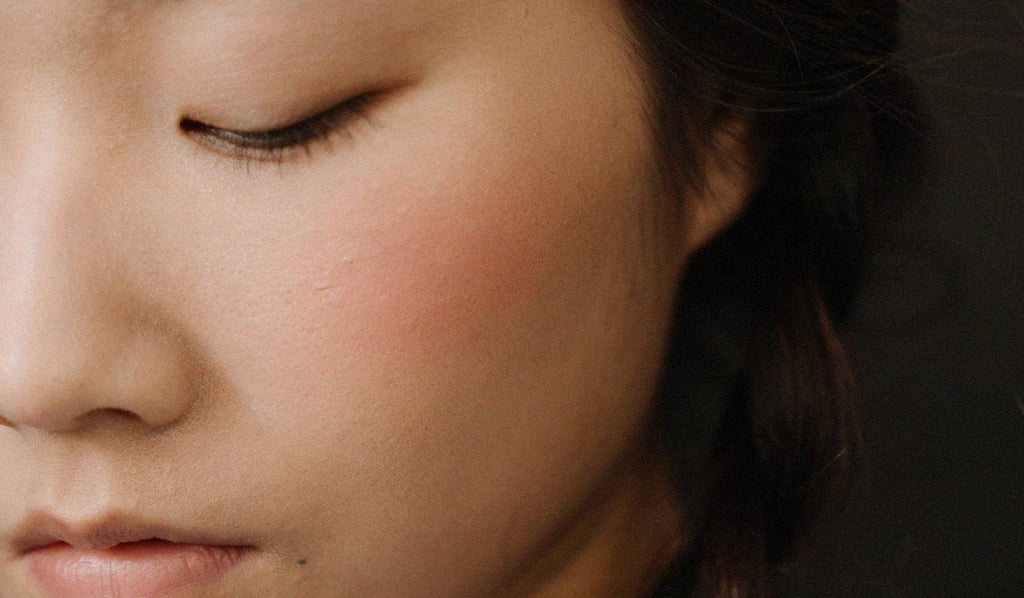Inflammation can cause acne, redness, rosacea, eczema, and more.

How Makeup Artists Use Blush for a Flattering Finish
Six insider tips for flawless blush application.

Skin inflammation, says Candace Marino, a celebrity aesthetician at The LA Facialist in Beverly Hills, is an umbrella term that describes many different inflammatory skin processes. In general, Joshua Zeichner, MD, a dermatologist, associate professor of dermatology, and director of cosmetic and clinical research in dermatology at Mount Sinai Hospital, says, “inflammation means that there is disruption of the normal skin structure along with dilated blood vessels and an influx of blood cells.”
So what causes skin inflammation? According to Marino, various internal and external factors can be the culprit. “Triggering stimuli include UV radiation, heat, allergens, irritants like fragrances/soaps, smoking, pollution, diet, dryness, impaired skin barrier, and more,” she says. “Hormones are also linked to inflammatory skin disorders like melasma and acne.”

Marino says skin inflammation can manifest in many different ways ranging from acute inflammation such as redness to chronic inflammatory conditions. Here are some of the most common forms of skin inflammation and their causes.
Acne: Acne is a form of skin inflammation that manifests as red bumps, pus pimples, blackheads, and whiteheads. “It starts when dead cell debris and oil get trapped in a pore and form a plug, blocking the opening of the pore,” Marino says. “Oil production continues, causing the area to become inflamed and attracts bacteria.”
Eczema: With eczema, Dr. Zeichner says the skin barrier isn’t working as well as it should be, which leads to microscopic cracks in the skin and loss of hydration. This results in dry, itchy, flaky patches of skin.
Melasma: This type of skin inflammation is caused by “an overproduction of melanin triggered by inflammatory triggers from heat, hormones or sun,” Marino says. “It appears as large, brown, discolored patches on the skin, typically on the forehead, cheeks, and upper lip.”
Psoriasis: Psoriasis can show up as red, thick patches with white scales, Dr. Zeichner says. He explains that with this condition, the skin is inflamed because the immune system gets angry at the skin itself leading to a buildup of dead cells on the skin’s surface.
Rosacea: Dr. Zeichner says people with this inflammatory condition will typically have redness, burning, and stinging in the middle third of the face. “It is caused by overactivity of the immune system in your skin, causing the skin to overreact to environmental triggers like spicy foods, hot beverages, or even alcohol,” he says.

A Healthy Lifestyle:“Inflammation is almost always lifestyle-related,” Marino says. She recommends practicing healthy rituals such as drinking enough water, getting rest, exercising, avoiding alcohol and smoking, and consuming anti-inflammatory foods like green tea, salmon, broccoli, and avocado, which can all go a long way in helping combat inflammation in the face and body.
Ice Therapy: Using ice therapy products, such as ice rollers, is a popular way to help reduce inflammation. “Ice and cool temperatures help constrict blood vessels to remove excess fluid and decrease inflammation,” Dr. Zeichner says. Marino recommends practicing ice therapy first thing in the morning for five to 10 minutes on clean skin.
Skincare: Combating skin inflammation also requires an appropriate, consistent skincare routine. Dr. Zeichner recommends incorporating products with skin-protecting ingredients such as purified petrolatum, ceramides, or oat extract. He also suggests anti-inflammatory ingredients such as niacinamide or botanical extracts like feverfew and licorice root extract.
Stay tuned for Rose Inc’s guide for treating skin inflammation with ice therapy and nourishing skincare ingredients.
This story was originally published on July 21, 2021.
Besotted
Beige pink
Add items to your bag to unlock this gift.
Satin Copper
Rich red copper
Heliotrope/Enigmatic
Apricot & Terracotta Pink
White Gold Shimmer
Light gold with pearl